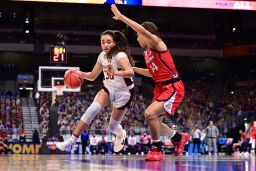One of the most storied programs in women’s college basketball history is back at the top after a 29-year wait.
And just barely.
The Stanford Cardinal – the No. 1 overall seed in this year’s NCAA tournament – has won the national championship, outlasting fellow Pac-12 Conference member and No. 3 seed Arizona 54-53 at the Alamodome in San Antonio, Texas, on Sunday.
Arizona had a chance to win in the final seconds, but star senior guard Aari McDonald couldn’t convert on a contested jumper at the buzzer.
This is Stanford’s third national title and first since 1992, tying Baylor for the third most in women’s basketball history. Only Connecticut (11) and Tennessee (eight) have more. This was the first time two Pac-12 teams met in the national championship game and the seventh time in NCAA history two teams from the same conference have done so.

All of Stanford’s titles, the first of which came in 1990, have come under the leadership of Tara VanDerveer, who in December became the winningest head coach in women’s basketball history. This was her 35th season with the Cardinal.
According to ESPN, as well as research from the NCAA, the 29 years between titles is the biggest gap for any Division I coach in any sport.
“This is a dream come true for our team. I think it’ll probably hit me tomorrow,” VanDerveer said.
For the Wildcats, in their first NCAA tournament appearance in 16 years, this was their first Final Four and championship game appearances in program history. They fall to 0-3 in games against Stanford this season – but this game was by far the closest.
“That’s a great basketball team we just beat,” Stanford senior guard Kiana Williams said. “It’s hard to beat a team three times, and we did that.”
McDonald led all scorers with 22 points, while sophomore guard Haley Jones, named the tournament’s most outstanding player, led Stanford with 17.
“(My teammates) just kept instilling me with their confidence that they had,” Jones said. “Down the stretch I just knew if the ball came to me, I knew I had to shoot it.”
While Stanford historically has dominated the Pac-12 – having won its 24th Pac-12 regular season championship and 14th Pac-12 tournament championship this season – it had been a long time since the program had reached the pinnacle nationally, last contesting a national championship game in 2010.
A year after the 2020 NCAA tournaments for the women and men were canceled because of the Covid-19 pandemic, this college basketball season saw varying methods of navigating through it. The pandemic postponed or canceled several games – and in some cases wiped out teams’ seasons altogether.
Some teams, like Duke, opted to end their season after just a handful of games because of the pandemic. Others, like the teams in the Ivy League, never got to play a game.
And there were situations such as the Cardinal’s. Regulations in Santa Clara County kept Stanford away from campus and forced the Cardinal to relocate for training and competition from November 29 through January 31.
“Getting through all the things we got through, we’re excited to win the Covid championship,” VanDerveer said.
Williams, a San Antonio native, said she thinks that time on the road helped the team.
“We didn’t want to do that, but afterward, we were thankful for it because we grew as a team,” Williams said. “We grew as individuals. That was hard, but it helped us.”
While it was a guarantee heading into Sunday that a team from the Pac-12 would win the national title, Sunday’s final represented the continuation of parity in the sport. This is the fourth different national champion since Connecticut won four in a row from 2013-2016.
And it was almost Arizona, the first Division I team in history to reach the Final Four after missing the previous 10 or more NCAA tournaments.
Led by 44-year-old head coach Adia Barnes, the Wildcats won their Sweet 16, Elite Eight and Final Four games by double digits – including stunning No. 1 seed UConn in Friday’s semifinal.
“We fought,” Barnes, the fourth head coach to lead her alma mater to the national championship game, said. “We weren’t the best team in the tournament. No one thought we’d be here. We believed in each other. We didn’t play a great game, but we battled. We played our hearts out. … We came within a basket of winning a national championship. So I’m proud. It’s hard. It does hurt. Like my heart’s broken. But I can’t ask for anything more of this team.”
















































































